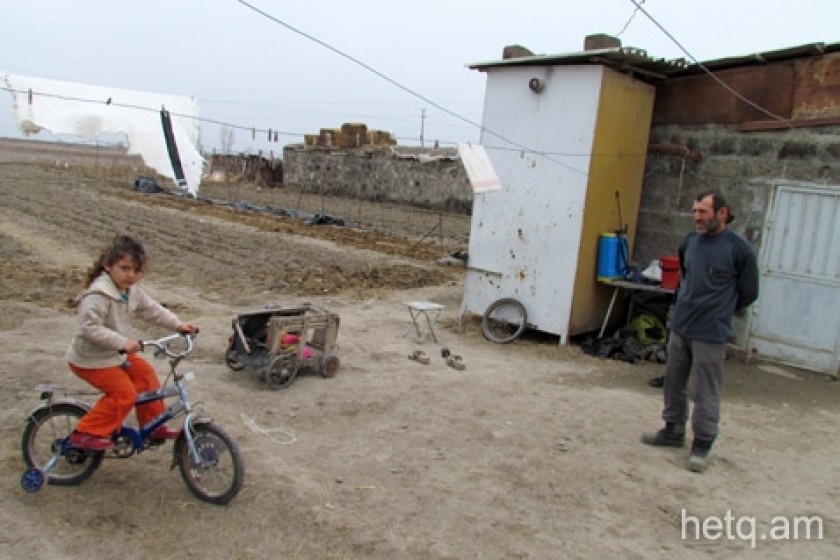
Artsakh War Vet: “I’m not complaining but living like this is an embarrassment”
I get a strange look when I ask Atom Tadevosyan, mayor of the Araksavan village in Ararat Province, if there are any needy families in the community.
After a few seconds, he blurts out the name of Armen Arsenyan; a 46 year-old father of three who fought in the Artsakh War.
I get directions to Armen’s home located on the outskirts of the village. I spot the squat house from a distance and see someone working in the yard whom I take to be Armen.
I say hello but the man doesn’t answer. I walk a bit closer and repeat my welcome. The man slowly turns and tells me to speak louder, explaining that he’s hard of hearing.
He reluctantly invites me inside and tells me to watch out for the low ceiling.
It’s dark inside. A stove sits in the middle of the room and dried dung is piled to the side as fuel.
I spot a cement hole by the door. Armen notices that I’m looking at it. In a wavering voice he says, “This is a stable. They used to shovel the animal excrement down there.”
Armen’s wife Hermineh appears and expresses her uneasiness with the idea of taking photos of the house. It would be embarrassing, she says, for her neighbors and her daughter’s friends to see the conditions they live in.
Armen then breaks the silence by telling me about his war experiences in Artsakh. From 1992-1994 he fought in Hadrout, Horadiz, Lachin and other areas. He says he suffered a contusion.
“My heart hurts, my head hurts. I can’t sleep. I always have to wear a hat to keep out the cold; even while sleeping,” Armen complains.
The family has been living in this structure, which once served as a stable, for five years.
They once lived in one of the rooms at the village kindergarten but had to find larger accommodations when the kids were born. The family then rented a house in the village but had to move out because they couldn’t afford the rent.
Armen tells me that years ago he contacted the defense ministry for help. He says they promised to build a house for him but that it never materialized. That’s when the family moved into the stable.
The war vet says he receives a monthly allotment of 53,000 AMD f (US$130) from the ministry. 29,000 is his military pension and 32,000 in the form of a financial subsidy.
I ask Hermineh about the tent located near the house. She says that it’s where they tend to the livestock of others for which they get paid 45,000 AMD a month. In addition, the family gets to use all the animal dung it needs for fuel.
While Armen doesn’t complain, he’s unhappy about the conditions in which he and his family live.
“On holidays, my old Artashat unit invites us to celebrate. We go, have fun, and then come home. That’s about it,” Armen says and shows me his military medals.
“These medals are my pride and joy,” he says, adding that the war isn’t over and that Armenia must be ready at a moment’s notice.
When I ask if he’ll fight again if war breaks out, Armen laughs. He then remains silent for a moment.
“I’m always asked that. How can I not go? If my old friends were to come and say ‘we’re ready to go’, I’d join them in a heartbeat. Who else will take care of these kids if danger strikes?”
Armen then shows me the war medal of his grandfather who fought with the Soviet Armey at Sevastopol and Berlin.
“This is the grandfather I had. How can I not go and fight,” Armen says with a smile.
Armen’s son is now in the army himself, serving in Artsakh.
If there is one thing that gets under his skin, Armen says it’s the way the veterans are given the short shrift.
“Look around. We’re living in a stable. Sure I get upset. Don’t get me wrong. It’s not that I’m complaining but living like this in this day and age is an embarrassment. There is no work to be found. I can hardly take care of my kids. When my son comes home on leave I can’t even give him a proper send off,” Armen says and goes outside.
I follow, and sadly have nothing to say in response.
 Videos
Videos Photos
Photos




Comments (3)
Write a comment